(GERMAN OCCUPATION OF THE CHANNEL ISLANDS) 1940 – 1945


La ocupación alemana de las Islas del Canal duró la mayor parte de la Segunda Guerra Mundial, desde el 30 de junio de 1940 hasta su liberación el 9 de mayo de 1945. La Bailía de Jersey y la Bailía de Guernsey son dos dependencias británicas de la Corona en el Canal de la Mancha, cerca de la costa de Normandía. Las Islas del Canal fueron la única parte de las Islas Británicas ocupada por la Wehrmacht (Fuerzas Armadas alemanas) durante la guerra.
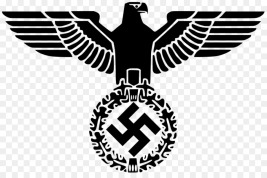
Anticipando una rápida victoria sobre Gran Bretaña, los ocupantes experimentaron utilizando un enfoque muy gentil que estableció el tema para los próximos cinco años. Las autoridades de la isla adoptaron una actitud similar, dando lugar a acusaciones de colaboración. Sin embargo, a medida que pasaba el tiempo, la situación empeoró gradualmente, terminando en inminente inanición tanto para los ocupados como para los ocupantes durante el invierno de 1944-45.
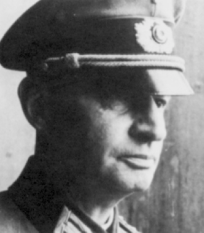
Entre el 3 de septiembre de 1939, cuando el Reino Unido declaró la guerra contra Alemania, y el 9 de mayo de 1940, poco cambió en las Islas del Canal. La conscripción no existía, pero varias personas viajaron a Gran Bretaña para unirse como voluntarios. Los comercios de horticultura y turismo continuaron con normalidad; el gobierno británico relajó las restricciones a los viajes entre el Reino Unido y las Islas del Canal en marzo de 1940, lo que permitió a los turistas del Reino Unido tomar vacaciones para elevar la moral en los complejos turísticos tradicionales de la isla.

La realización de la necesidad de la evacuación civil de las Islas del Canal llegó muy tarde. Al no mantenerse la planificación y el secreto, las comunicaciones entre los gobiernos de las islas y el Reino Unido tuvieron lugar en una atmósfera de confusión y mala interpretación. La opinión fue dividida y el caos siguió con diferentes políticas adoptadas por las diferentes islas. El gobierno británico concluyó que su mejor política era hacer disponible tantos barcos como fuera posible para que los isleños tuvieran la opción de irse si quisieran.

Los alemanes no se dieron cuenta de que las islas habían sido desmilitarizadas (las noticias de la desmilitarización habían sido suprimidas hasta el 30 de junio de 1940) y se les acercaron con cautela. Los vuelos de reconocimiento no fueron concluyentes. El 28 de junio de 1940, enviaron un escuadrón de bombarderos sobre las islas y bombardearon los puertos de Guernsey y Jersey. En St. Peter Port, la ciudad principal de Guernsey, algunos camiones alineados para cargar tomates para su exportación a Inglaterra se confundieron con los vuelos de reconocimiento para los transportistas de tropas. Un ataque similar ocurrió en Jersey donde nueve murieron. En total, 44 isleños fueron asesinados en las redadas.

Mientras la Wehrmacht estaba preparando la Operación Grünpfeil (Flecha Verde), una invasión planeada de las islas con tropas de asalto formadas por dos batallones, un piloto de reconocimiento, Hauptmann Liebe-Pieteritz, hizo una prueba aterrizando en el aeródromo abandonado de Guernsey el 30 de junio para determinar el nivel de defensa. Informó de su breve aterrizaje en Luftflotte 3, que llegó a la conclusión de que las islas no estaban defendidas. Un pelotón de aviadores de la Luftwaffe fue volado esa noche a Guernsey por aviones de transporte de Junkers. El inspector Sculpher de la policía de Guernsey fue al aeropuerto con una carta firmada por el alguacil que decía que “esta isla ha sido declarada isla abierta por el gobierno del Reino Unido de su majestad.

Las autoridades alemanas cambiaron la zona horaria de Channel Island de GMT a CET para alinear las islas con la mayor parte de Europa continental, y la regla de la carretera también se cambió a conducir por la derecha. El dinero de la ocupación se emitió en las islas para mantener la economía en marcha. Las fuerzas militares alemanas usaron el scrip para el pago de bienes y servicios. Los lugareños empleados por los alemanes también fueron pagados en Reichsmarks de ocupación. Los alemanes permitieron que el entretenimiento continuara incluyendo cines y teatro; sus bandas militares actuaron en público.

La vida como civil durante la ocupación fue un shock. Tener sus propios gobiernos que continúen gobernando los suavizó y mantuvo a la mayoría de los civiles a distancia de sus opresores. Muchos perdieron sus trabajos cuando las empresas cerraron y era difícil encontrar trabajo con empleadores no alemanes. A medida que avanzaba la guerra, la vida se hizo más dura y la moral cayó, especialmente cuando se confiscaron las radios y luego cuando las deportaciones tuvieron lugar en septiembre de 1942. La comida, el combustible y las medicinas escaseaban y el crimen aumentaba. Después del 6 de junio de 1944, la liberación llegó a ser más probable en la mente popular, pero los tiempos más difíciles para los civiles aún estaban por llegar. El invierno de 1944-45 fue muy frío y hambriento, y gran parte de la población se salvó de la inanición por la llegada de los paquetes de la Cruz Roja.

Durante junio de 1944, las Fuerzas Aliadas lanzaron los desembarcos del Día D y la liberación de Normandía. Decidieron eludir las Islas del Canal debido a sus fuertes fortificaciones descritas anteriormente. Como resultado, las líneas de suministro alemanas para alimentos y otros suministros a través de Francia fueron completamente cortadas. Los suministros de comida de los isleños ya estaban disminuyendo, y esto empeoró las cosas considerablemente: los isleños y las fuerzas alemanas estaban a punto de morir de hambre.

Aunque los planes habían sido elaborados y propuestos en 1943 por el Vicealmirante Lord Louis Mountbatten para la Operación Constelación, una reconquista militar de las islas, estos planes nunca se llevaron a cabo. Las Islas del Canal fueron liberadas después de la rendición alemana. Sark fue liberado el 10 de mayo de 1945, y las tropas alemanas en Alderney se rindieron el 16 de mayo de 1945. Los prisioneros de guerra alemanes fueron expulsados de Alderney antes del 20 de mayo de 1945, y su población comenzó a regresar en diciembre de 1945.
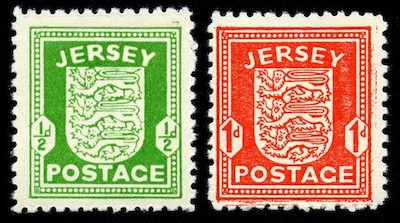
The German occupation of the Channel Islands lasted for most of the Second World War, from 30 June 1940 until their liberation on 9 May 1945. The Bailiwick of Jersey and Bailiwick of Guernsey are two British Crown dependencies in the English Channel, near the coast of Normandy. The Channel Islands were the only part of the British Isles to be occupied by the Wehrmacht (German Armed Forces) during the war.

Anticipating a swift victory over Britain, the occupiers experimented by using a very gentle approach that set the theme for the next five years. The island authorities adopted a similar attitude, giving rise to accusations of collaboration. However, as time progressed the situation grew gradually worse, ending in near starvation for both occupied and occupiers during the winter of 1944–45.
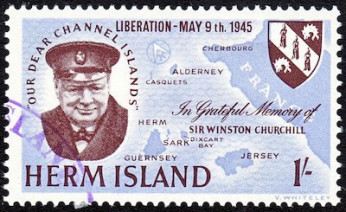
Between 3 September 1939, when the United Kingdom declared war against Germany, and 9 May 1940, little changed in the Channel Islands. Conscription did not exist, but a number of people travelled to Britain to join up as volunteers. The horticulture and tourist trades continued as normal; the British government relaxed restrictions on travel between the UK and the Channel Islands in March 1940, enabling tourists from the UK to take morale-boosting holidays in traditional island resorts.
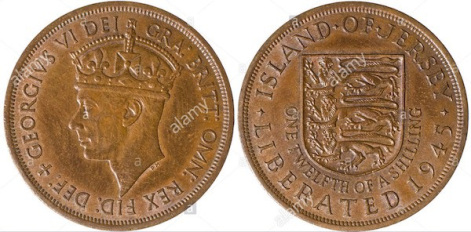
The realisation of the necessity of civilian evacuation from the Channel Islands came very late. With no planning and secrecy being maintained, communications between the island governments and the UK took place in an atmosphere of confusion and misinterpretation. Opinion was divided and chaos ensued with different policies adopted by the different islands. The British government concluded its best policy was to make available as many ships as possible so that islanders had the option to leave if they wanted to.

The Germans did not realise that the islands had been demilitarised (news of the demilitarisation had been suppressed until 30 June 1940), and they approached them with caution. Reconnaissance flights were inconclusive. On 28 June 1940, they sent a squadron of bombers over the islands and bombed the harbours of Guernsey and Jersey. In St. Peter Port, the main town of Guernsey, some lorries lined up to load tomatoes for export to England were mistaken by the reconnaissance flights for troop carriers. A similar attack occurred in Jersey where nine died. In total, 44 islanders were killed in the raids.
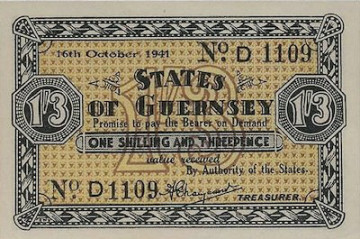
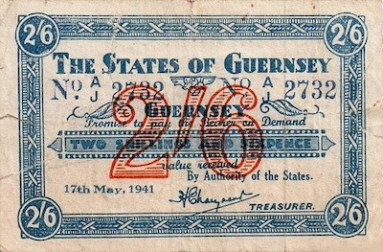
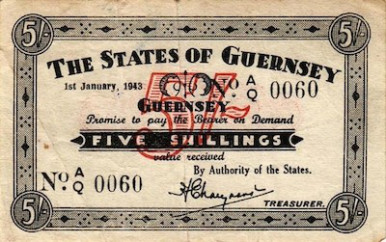
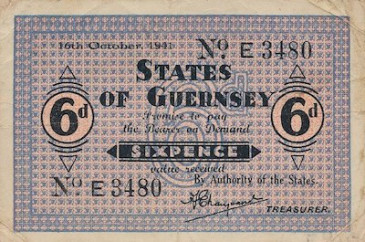
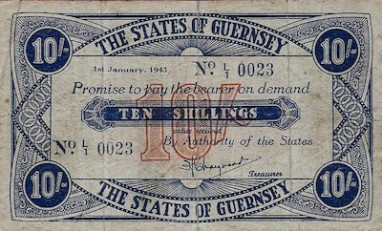
While the Wehrmacht was preparing Operation Grünpfeil (Green Arrow), a planned invasion of the islands with assault troops comprising two battalions, a reconnaissance pilot, Hauptmann Liebe-Pieteritz, made a test landing at Guernsey’s deserted airfield on 30 June to determine the level of defence. He reported his brief landing to Luftflotte 3 which came to the decision that the islands were not defended.

A platoon of Luftwaffe airmen was flown that evening to Guernsey by Junkers transport planes. Inspector Sculpher of the Guernsey police went to the airport carrying a letter signed by the bailiff stating that “This Island has been declared an Open Island by His Majesty’s Government of the United Kingdom.

The German authorities changed the Channel Island time zone from GMT to CET to bring the islands into line with most of continental Europe, and the rule of the road was also changed to driving on the right. Occupation money was issued in the islands to keep the economy going. German military forces used the scrip for payment of goods and services. Locals employed by Germans were also paid in the Occupation Reichsmarks. The Germans allowed entertainment to continue including cinemas and theatre; their military bands performed in public.

Life as a civilian during the occupation came as a shock. Having their own governments continuing to govern them softened the blow and kept most civilians at a distance from their oppressors. Many lost their jobs when businesses closed down and it was hard to find work with non-German employers. As the war progressed, life became harsher and morale fell, especially when radios were confiscated and then when deportations took place in September 1942.

Food, fuel, and medicines became scarce and crime increased. Following 6 June 1944, liberation became more likely in the popular mind, but the hardest times for the civilians was still to come. The winter of 1944-45 was very cold and hungry, many of the population being saved from starvation by the arrival of Red Cross parcels.

During June 1944, the Allied Forces launched the D-Day landings and the liberation of Normandy. They decided to bypass the Channel Islands due to their heavy fortifications described above. As a result, German supply lines for food and other supplies through France were completely severed. The islanders’ food supplies were already dwindling, and this made matters considerably worse – the islanders and German forces alike were on the point of starvation.

Although plans had been drawn up and proposed in 1943 by Vice Admiral Lord Louis Mountbatten for Operation Constellation, a military reconquest of the islands, these plans were never carried out. The Channel Islands were liberated after the German surrender. Sark was liberated on 10 May 1945, and the German troops in Alderney surrendered on 16 May 1945. The German prisoners of war were removed from Alderney by 20 May 1945, and its population started to return in December 1945.

OTRAS DE MIS WEBS
CEUTA DESCONOCIDA: http://www.ceutadesconocida.wordpress.com
PAISES DESAPARECIDOS: http://www.paisesdesaparecidos.wordpress.com
